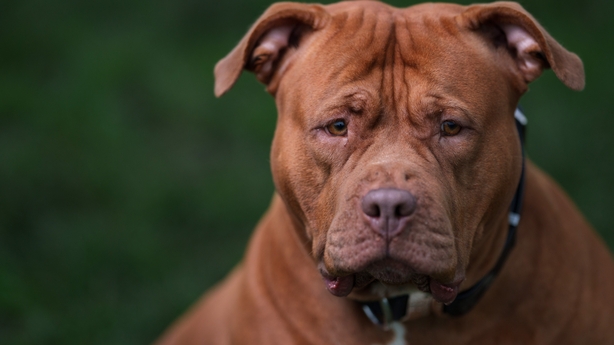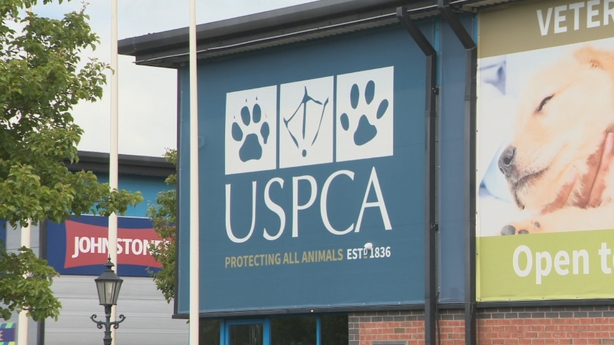The ban on XL bully dogs under new regulations to be introduced later this year has raised concerns with animal welfare organisations about how such a ban will be enforced, with one group saying clarity is needed.
The ban will be implemented in two phases between October and February, and follows calls for tighter dog control measures after a number of high-profile dog attacks.
A member of the Control of Dogs Working Group has said that while the incoming restrictions on XL bullies will be a challenge, they are "fair and appropriate" given the level of danger posed to the public by the breed.
Speaking on RTÉ's Today with Claire Byrne James Madden, who is also a veterinarian with Leitrim County Council, said the UK and Northern Ireland had already moved in this direction and it was "inevitable" that Ireland would follow.
He said that since a similar ban was introduced in the UK, the number of XL bullies in Ireland had increased.
"We want to stabilise the numbers and then over time the numbers will decrease as those dogs reach the end of their natural lives," he said.
Mr Madden said it is their intention to enforce the regulations "rigorously" and to minimise the black market, adding that they hope to recruit more dog wardens in the future.

'Like a mass murder'
Speaking on the same programme, Martina Kenny of My Lovely Horse Rescue said that while XL bullies should be registered and proof of training should be provided, to ban them entirely is "like a mass murder".
She said XL bullies are being abandoned every day and there is no place for them now in rescues.
"How does the Government think we're going to actually sort this problem out?" she asked.
"And also it seems to say 'no rehoming' so does that mean that rescues can't rehome them? Even though we would have them neutered, registered with a certificate, proof of training.
"It's very worrying."
Just outside Dundalk, the Louth SPCA can provide shelter for up to 30 dogs along with a variety of other animals.
Inspector Fiona Squibb has mixed feelings about the prospect of a ban and says owners, the general public and people who work in services like the Louth SPCA need clarity.
"I think the Government needs to really give a clear definition of what they expect as to who is going to look after all of this?
"It's going to be a big project for anybody," she said.
"Also, who is going to enforce the law? We've had laws before for a long time on the control of dogs and they haven't been enforced, so I don't know how they're going to enforce this."
She is concerned that rescuers could be "very stuck" if they cannot accept this type of dog, and if they also cannot be rehomed.
Ms Squibb described this as "an awful situation", saying that these dogs "didn't ask to be born".
She agreed with the provision for neutering and the introduction of the exemption certificate, which would allow existing owners to keep their dogs if they can prove they have met certain criteria.
The Northern Ireland ban came into effect a week ago on 5 July and has encountered opposition from some quarters.
The measures mean people can no longer breed, sell, give away or abandon XL bullies.
It also includes the use of leads and muzzles.
The second phase will involve an exemption certificate, with conditions including neutering and microchipping.
The USPCA, based in Newry, Co Down, is among those against this ban.
Nora Smith, Chief Executive of the USPCA, said that a ban on a small number of other breeds in the UK, that has been in existence for more than 30 years, has failed to reduce the number of dog attacks.

She said that while dog attacks are a big concern for the organisation, the solutions are more complex than an outright ban.
Ms Smith said: "It sounds like action.
"It sounds like a really positive step to say 'we're banning a breed and that will stop dog attacks'. It hasn't worked for 32 years so why is it going to happen now?"
Ms Smith said that the answer to dog aggression is "much more complex and nuanced" and comes down to things like how the dog is bred, its life experiences, how responsible its owner is and socialisation.
She said that a big part of this is responsible dog ownership and there needs to be a bigger conversation around breeding.
"For us, it's the deed, it's not the breed," she said.
"Any dog can be aggressive in the wrong environment and in the wrong hands, those are the complex issues we need to deal with," she added.
Ms Smith said "simply branding one breed as aggressive lures the public into a false sense of security".
She added that it "isn't going to fundamentally address the issue of dog attacks".
Ms Smith also said the new laws have put rehoming organisations like the USPCA in an "impossible situation".
She said: "From last Friday, we can no longer take XL bullies into our care.
"We can't rehome any that are currently in our care.
"We don't have them in Newry, but we know other rescues that do."
Ms Smith said it puts the USPCA "in this impossible position where rescues can apply for exemptions and confine dogs to kennels for the rest of their lives or put a healthy dog to sleep".
She said the USPCA has had queries from some owners about what the laws means for them and asking for advice.
"Our plea and our ask is that we want to keep our much-loved family pets where they belong, we know these new rules are upsetting and unsettling for responsible XL bully owners, but please follow the rules," she said.
"There's nothing to say you can't keep your dog with you as part of your family unit for a really long time providing you follow conditions set as part of this legislation that has been extended," she added.







